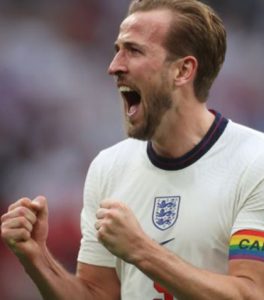England’s soccer team representing its diversity
As hopes rise in the UK that the England football team might win a trophy at the 2021 Euros – it’s first since 1966 – a new exhibition highlights the impact migration has had on the sport.
London’s Migration Museum has launched a campaign titled #FootballMovesPeople on billboards and pub screens across the country.
 The campaign shares alternative starting line ups ahead of each England game. It removes the players who start each game but who wouldn’t have been there without the impact of first-and-second-generation immigrants.
The campaign shares alternative starting line ups ahead of each England game. It removes the players who start each game but who wouldn’t have been there without the impact of first-and-second-generation immigrants.
For instance, in the recent crucial quarter final match with Germany, just three players remained.
Meanwhile, this England squad, under manager Gareth Southgate, has prided itself on being inclusive and intolerant of racism, which has recently made something of a comeback in European football.
Throughout the competition, the team has continue to ‘take a knee’ in support of the Black Lives Matter movement, despite condemnation from senior government ministers and booing from crowds.
And England striker Harry Kane, has defied an edict from ruling body UEFA on publicly backing LGBTQ+ rights, and continued to wear a rainbow armband.
England’s journey to a second successive semi-final at a major international tournament coupled with the museums’ campaign has sparked conversation and perhaps reminded people what it might mean to be English.
The Migration Museum opened in London in April 2017, dedicated to sharing stories about how movement has shaped what Britain looks like today.
It has hosted exhibitions and workshops to champion immigration as a ‘powerful force for good’.
Since 2013, the Migration Museum has run workshops with more than 12,000 students from over 200 schools and colleges.
“It’s no exaggeration to say that without migration, football as we know it wouldn’t exist,” said head of public engagement at the Migration Museum Robyn Kasozi.
“But migration has shaped far more than football. It goes to the heart of who we all are, where we come from, and where we’re going.”
When it comes to progress and tolerance, England’s manager Gareth Southgate has also led the way.
In an essay called ‘Dear England’, published in the Players Tribune in June, Southgate reflected on what it means to represent your country – in football and as role models for young people.
“I understand that on this island, we have a desire to protect our values and traditions – as we should – but that shouldn’t come at the expense of introspection and progress,” he wrote.
“I have never believed that we should just stick to football.
“I know my voice carries weight, not because of who I am but because of the position that I hold. At home, I’m below the kids and the dogs in the pecking order but publicly I am the England men’s football team manager. I have a responsibility to the wider community to use my voice, and so do the players.
“It’s their duty to continue to interact with the public on matters such as equality, inclusivity and racial injustice, while using the power of their voices to help put debates on the table, raise awareness and educate,” Southgate wrote.
‘Well-planned migration’ is one of the 17 Sustainable Development Goals the UN has championed to reduced inequality and end extreme poverty before 2030.
But migration can only be well-planned if it is safe and discussed respectfully.
Win or lose – and despite Britain’s current toxic political environment – the impact and importance of England’s soccer team at these Euros might resonate longer and further than the celebrations over a piece of silverware.
Read Gareth Southgate’s essay here: Dear England by Gareth Southgate | The Players’ Tribune












